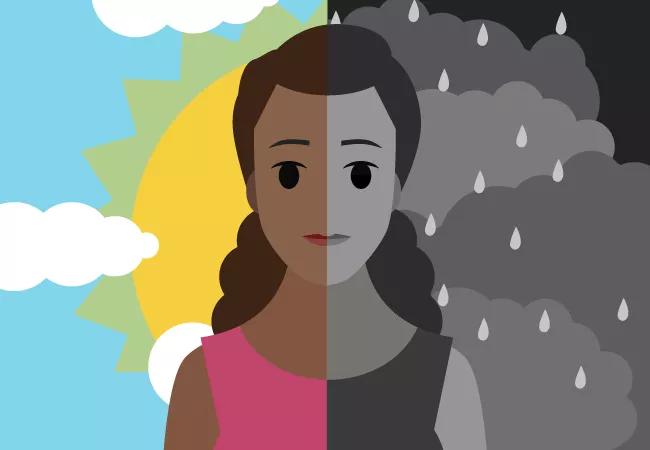Discover the facts about this brain illness

Image content: This image is available to view online.
View image online (https://assets.clevelandclinic.org/transform/de4667ef-c5dc-460d-a568-4ff9ecfdcb83/bipolar-disorder_png)
Bipolar Disorder
Swinging wildly between euphoria and depression. Psychotic breaks. That’s how many people view bipolar disorder.
Advertisement
Cleveland Clinic is a non-profit academic medical center. Advertising on our site helps support our mission. We do not endorse non-Cleveland Clinic products or services. Policy
But the reality is quite different, says psychiatrist Amit Anand, MD. Here, he upends common misconceptions about the brain disorder:
“Many people believe that those with bipolar disorder are out of control and psychotic,” says Dr. Anand. “But we have learned over the last few decades that milder forms of bipolar disorder are much more common.”
The two main types of bipolar illness are bipolar I and bipolar II. Beyond that, bipolar illness takes many forms.
“Thus, most people with bipolar disorder live in the community and may never be admitted to a psychiatric hospital,” says Dr. Anand.
“Mood swings happen for many different reasons, including the weather, the menstrual cycle, common medications like steroids, and substance use,” says Dr. Anand.
Moodiness can also occur with medical illnesses such as hormone disorders, autoimmune diseases and neurological problems.
Advertisement
And mood swings occur with other brain illnesses, such as attention-deficit hyperactivity disorder (ADHD) and certain personality disorders.
What sets bipolar disorder apart? “The illness represents a change from the usual self,” explains Dr. Anand. “Also, depression lasts for several weeks at a time, and mania lasts for several days at a time. We look for a season of summer — not one hot day.”
People often assume that in bipolar disorder, periods of mania alternate regularly with periods of depression.
“In bipolar disorder, mood is more often chaotic, with random combinations of symptoms,” says Dr. Anand. “It is not cyclical.”
This helps fuel the turmoil that often unravels relationships with family, friends and coworkers — even in mild cases of bipolar disorder.
That is why treatment is so important.
“We have very, very effective treatments for bipolar illness,” says Dr. Anand. “Patients generally respond well to mood-stabilizing drugs, sometimes combined with antidepressants and/or drugs for mania.”
Psychotherapy is always recommended, he says, and offers many benefits by:
If you suspect that you or someone you love may have bipolar disorder, get a full evaluation from a psychiatrist.
“Too often, bipolar disorder is not diagnosed, or it is mistaken for another problem,” says Dr. Anand. “Get one good diagnostic evaluation. Then, know that some very effective treatments can help you lead a normal life, like anyone else.”
Advertisement

Delivered every Tuesday!
Sign up for our Health Essentials emails for expert guidance on nutrition, fitness, sleep, skin care and more
It's a letter about the news!
Learn more about our editorial process.
Advertisement
Both include bouts of depression, but differ in their extremes
Bipolar’s milder cousin has its own ups and downs
Most recommended precautions center around minimizing bruising or swelling
Even one drink can have an impact on your cognitive function leading to slurred speech, blurred vision and impaired memory
Understand who may (and may not) benefit
Lorem ipsum dolor sit amet. Et odio Quis vel ipsam omnis eum alias deleniti et placeat impedit non voluptas galisum hic autem enim et cupiditate aliquid. Est beatae quidem non facilis autem ut commodi nisi aut tempore rerum et dolores voluptatem cum enim optio id sapiente quasi. Ad laboriosam officiis 33 cupiditate sequi ea voluptatum consectetur qui necessitatibus voluptate et quasi doloremque et facere explicabo quo explicabo officia
Type 2 diabetes isn’t inevitable with these dietary changes
Applying a hot or cold compress can help with pain
Pump up your iron intake with foods like tuna, tofu and turkey